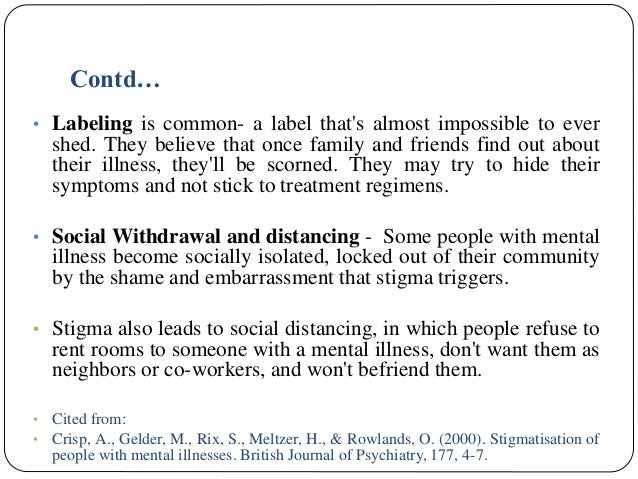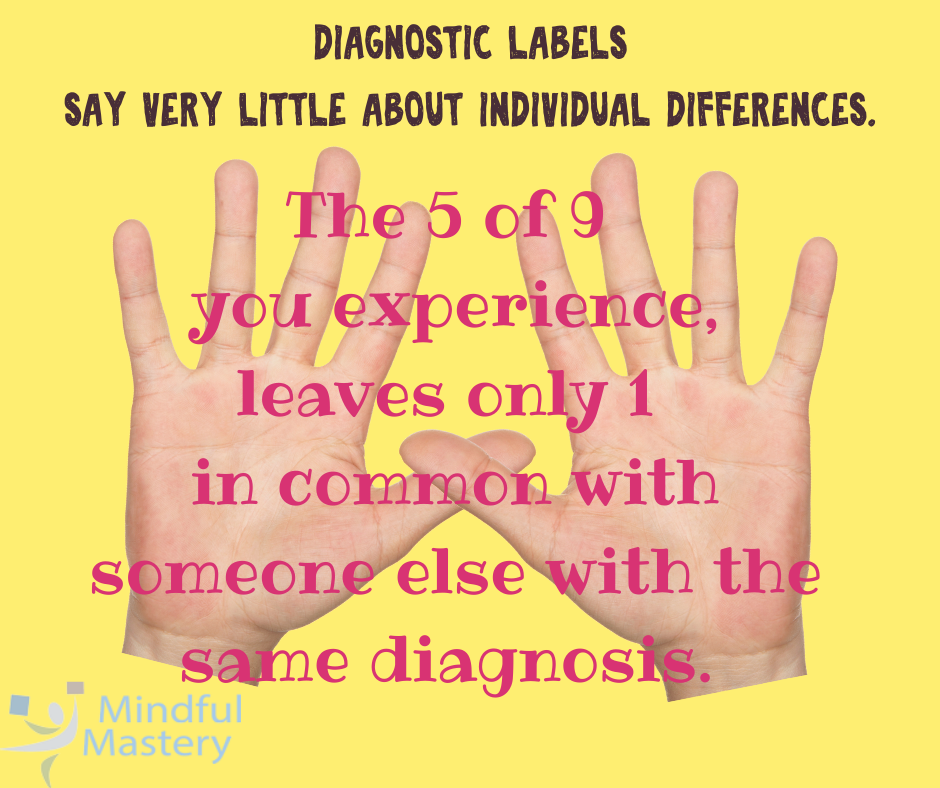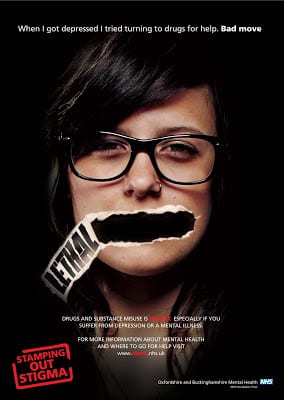43 mental health labels stigma
Mental Health Labels and Their Effects on Public Stigma among College ... Based on the body of literature addressing how mental health stigma is transmitted via the labels used to refer to mental health, it was predicted that mental health labels with a longer history of use, such as mental illness or psychiatric disorder, would carry more mental health stigma than newer labels like mental health concern or a control ... Labels Hurt. Examining the Impact of Mental Health Stigma Below are some of the harmful consequences associated with mental health stigma: Increased psychiatric symptoms and reduced prognosis. Reluctance to seek treatment or stick with it. Social isolation Lack of understanding by family, friends, coworkers, or others Fewer opportunities for work, school, social activities, or trouble finding housing
Words have power: the stigma of labelling mental illness Mental Illness Labels and Young People. When a study was conducted to investigate how young people perceived mental illness and which words or labels they use or have heard applied to people living with mental illness, they came up with over 250 of them! The most frequently reported labels in this study included "disturbed", "nuts ...
Mental health labels stigma
The Truth About Mental Health Labels and Stigma May is Mental Health Awareness Month. One thing that continues to be a difficulty with mental health is the stigma of having a mental illness (perceived or otherwise). For me, I used to believe that having a mental illness meant I had a label I couldn't shake; a label that defined me, that made me feel less. Inferior. Broken. Broken. PDF The feelings and thoughts of mental health nurses concerning the ... the stigma associated with mental health problems [5]. These violations tend to be related to the use of coercive interventions [3]. Common forms of coercion used dur- ing inpatient treatment include seclusion and mechanical restraints, physical holding, restricted leave and forced Beyond Labels: Reducing Health-Related Stigma | RTI This is stigma. Stigma keeps people from accessing the best possible care. People with substance use disorders, infectious diseases, mental health, or other health conditions often feel judged and blamed by family, friends, and healthcare providers, which can keep them from getting the care they need. Stigma has consequences.
Mental health labels stigma. Reframing Mental Health Labels - NAMI: National Alliance on Mental Illness To make matters worse, mental health labels are often associated with stigma. For me, these labels represented my shame and the stigma of how others would perceive me. I let those letters degrade my sense of worth. I saw myself as unable to do things other people can. EOF Why Labels Can Be Harmful When You Have Mental Illness OCT. 20, 2021 By Cindy Tillory When you are young, society seems to hand out labels like candy on Halloween. Growing up, I was labeled "the Black kid," "the weirdo," "the nerd," "the fat kid." The world around me seemed to dole out these categories without a second thought, and I let them define me throughout my childhood. The stigma of mental illness: effects of labelling on public attitudes ... Labelling has practically no effect on public attitudes towards people with major depression. Conclusion: Our findings illustrate the need for differentiation, differentiation between the different components of stigma as well as differentiation between the various mental disorders. Publication types Research Support, Non-U.S. Gov't MeSH terms
Stigmatizing Words, Labels - HealthyPlace When talking mental health, stigma refers to the misinformed perceptions and ideas about mental illness and those with it. It's a big component in why people feel ashamed to have a mental illness and suffer in silence instead of seeking mental health treatment and understanding that mental illness is just an illness. Why is There so Much Stigma Surrounding Mental Illness? Mental health stigma stems from an array of factors and misconceptions including: ... Consequently, these labels can be paired with stigmatizing beliefs that prevent people from speaking out. It's more important than ever, with mental illnesses on the rise, that we educate ourselves about mental health stigma, and work towards eradicating it ... Removing Self-Stigma from Mental Health Labels | HealthyPlace Seems the word "mental" is unnecessary and redundant label. People can say cancer and relate, treat, and understand without additional labels. People can say depression, ADHD, anxiety and relate, treat, and understand without the word "mental" in front of illness or health. It only seems to create more stigma. The Impact of an eLearning Course on Nurses' Attitudes towards Mental ... A multicentre randomized controlled open label design was used and the study protocol has been registered (ISRCTN32869544). The study was conducted according to CONSORT guidelines [20] . ... Schulze, B. (2007) Stigma and Mental Health Professionals: A Review of the Evidence on an Intricate Relationship. International Review of Psychiatry, 19 ...
Frontiers | Factors Affecting Treatment Regress and Progress in ... Introduction. The World Health Organization's European' Mental Health Action Plan 2013-2020 (WHO action plan) strives to (a) improve the mental wellbeing of the population and reduce the burden of mental disorders, with a special focus on vulnerable groups, exposure to determinants and risk behaviors, (b) respect the rights of people with mental health problems and offer equitable ... Stigma: Mental Health & Substance Abuse - American Addiction Centers Research has demonstrated that stigma creates obstacles to seeking treatment for substance use disorders or mental illness and leads to negative health outcomes. A group of leaders from the National Institutes of Health define stigma as "negative attitudes toward people that are based on certain distinguishing characteristics.". Stigma, Prejudice and Discrimination Against People with Mental Illness Self-stigma refers to the negative attitudes, including internalized shame, that people with mental illness have about their own condition. Institutional stigma, is more systemic, involving policies of government and private organizations that intentionally or unintentionally limit opportunities for people with mental illness. Labeling of mental disorders and stigma in young people There were no significant associations between label use and the stigma components of "stigma perceived in others", "reluctance to disclose" and for the most part "social distance". Most mental health labels were associated with seeing the person as "sick" rather than "weak" and accurate psychiatric labels had the strongest effect sizes.
The feelings and thoughts of mental health nurses concerning the ... As a result, mental health nurses have different experiences, various emotional quandaries concurrent with cognitive dissonance and different coping strategies when caring for and supporting distressed and disturbed patients. ... G.E. (2010) Stigma in mental health: Clients and professionals, issues in mental health nursing, 31, 450-455. http ...
Mental health: Overcoming the stigma of mental illness Stigma is when someone views you in a negative way because you have a distinguishing characteristic or personal trait that's thought to be, or actually is, a disadvantage (a negative stereotype). Unfortunately, negative attitudes and beliefs toward people who have a mental health condition are common. Stigma can lead to discrimination.

My Life With Bipolar Disorder And My Passionate Journey Towards Kissing Stigma Goodbye!!: Mental ...
Beyond Labels: Reducing Health-Related Stigma | RTI This is stigma. Stigma keeps people from accessing the best possible care. People with substance use disorders, infectious diseases, mental health, or other health conditions often feel judged and blamed by family, friends, and healthcare providers, which can keep them from getting the care they need. Stigma has consequences.
PDF The feelings and thoughts of mental health nurses concerning the ... the stigma associated with mental health problems [5]. These violations tend to be related to the use of coercive interventions [3]. Common forms of coercion used dur- ing inpatient treatment include seclusion and mechanical restraints, physical holding, restricted leave and forced
(PDF) Reducing Mental Health Stigma Through Identification With Video Game Avatars With Mental ...
The Truth About Mental Health Labels and Stigma May is Mental Health Awareness Month. One thing that continues to be a difficulty with mental health is the stigma of having a mental illness (perceived or otherwise). For me, I used to believe that having a mental illness meant I had a label I couldn't shake; a label that defined me, that made me feel less. Inferior. Broken. Broken.

Removing the stigma: Labels pose challenge in facing mental health issues | Featured-pnr ...











Post a Comment for "43 mental health labels stigma"